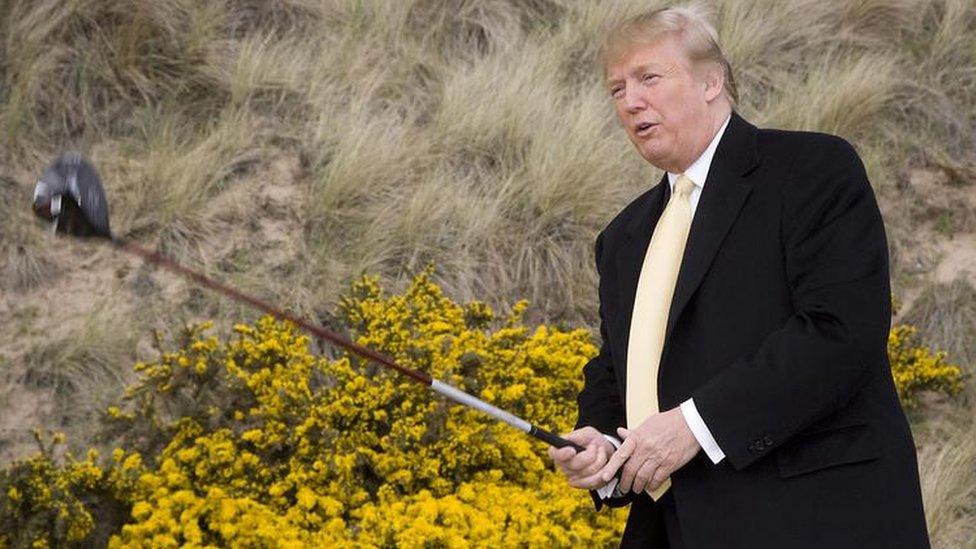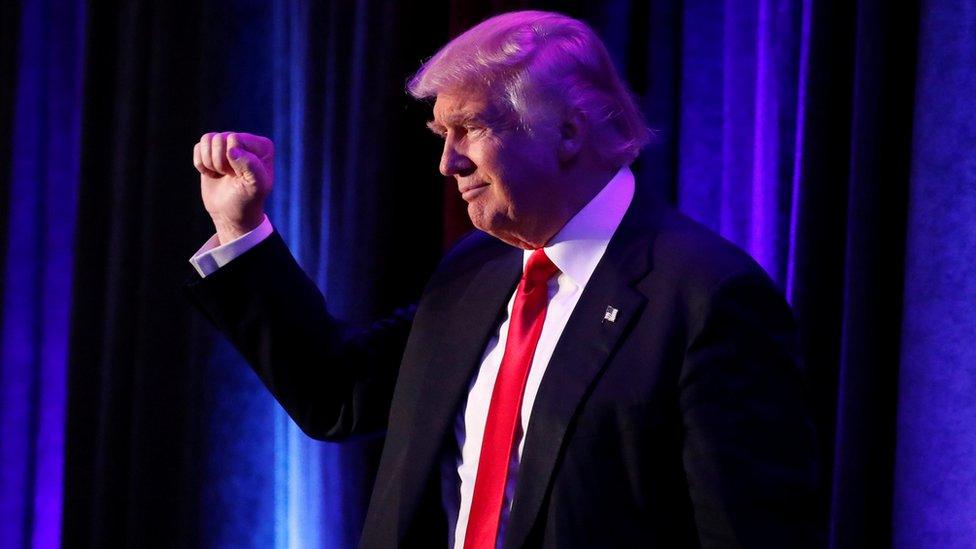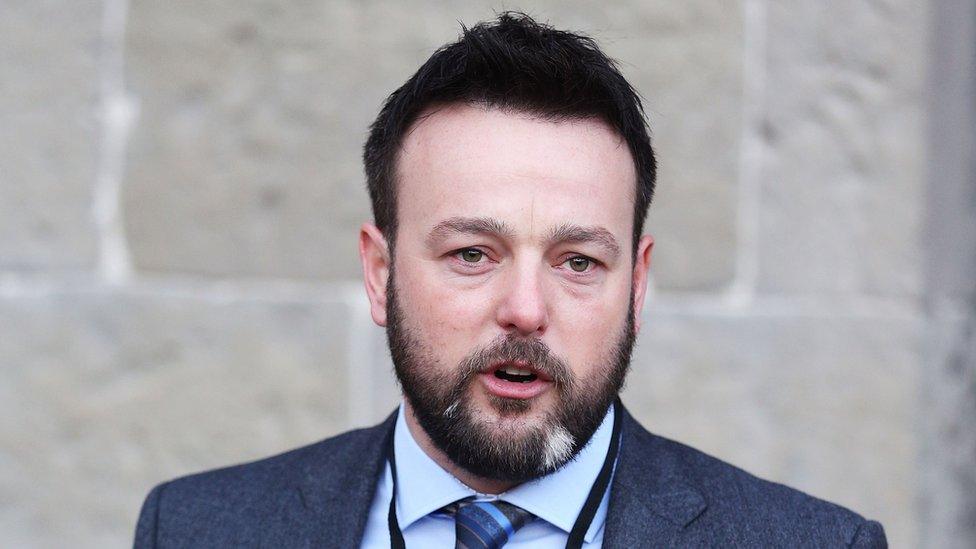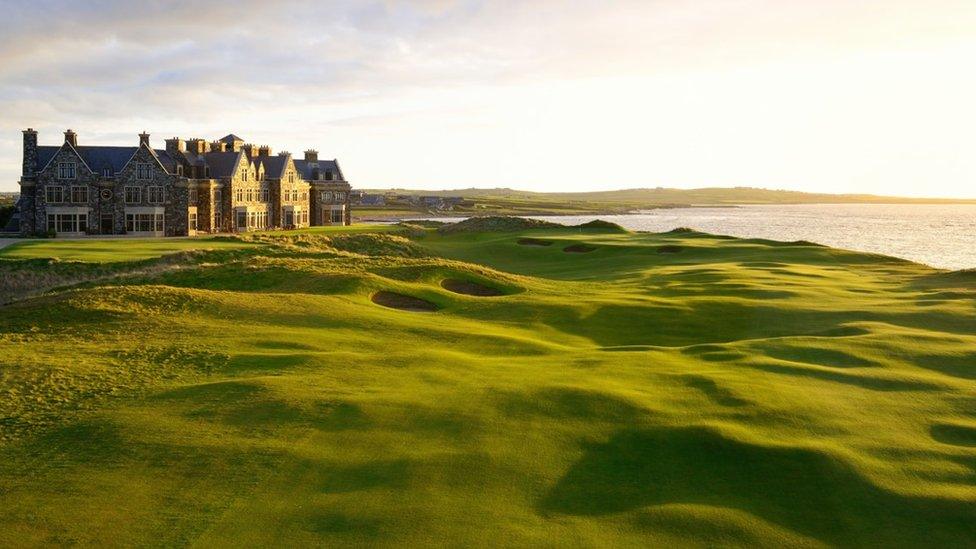Trump US election victory: Northern Ireland reacts
- Published

Property mogul Donald Trump considered building a £1bn golf resort in County Antrim back in 2007
The first and deputy first ministers have congratulated Donald Trump on becoming the 45th president of the United States.
He claimed a shock victory over Democratic candidate Hillary Clinton in Tuesday's election.
First Minister Arlene Foster said she looked forward to working with his administration.
She said Northern Ireland has "strong historical, economic and political ties to the United States".
"As our largest inward investor, the US plays a massive role in our economic progress," she said.
Deputy First Minister Martin McGuinness said he would "work constructively with President Trump" to "maintain and strengthen our well established and deeply valued relationship with the US".
"Over many years, successive US administrations have made a major contribution to both our peace process and economic development and I expect this to continue," he said.

Analysis by BBC NI Political Editor Mark Devenport
In comparison to Hillary Clinton, who made several visits to Northern Ireland over the past 21 years, Donald Trump is more of an unknown quantity so far as most Stormont politicians are concerned.
But not entirely unknown. The New York billionaire shook hands with Gerry Adams at a Manhattan fundraiser in 1995.
More recently, he met the late Ian Paisley in 2007 to discuss buying a North Coast golf resort, external. But the deal never came off.
He does own a golf resort in County Clare which he referred to both as "perfecto" and "small potatoes" during the campaign.
Some locals in Doonbeg hope Donald Trump will do for them what Barack Obama did for Moneygall.

Mr Trump's victory has provoked varied reactions from Northern Ireland politicians
The kind of access Stormont politicians might have enjoyed at the White House under a Hillary Clinton presidency seems unlikely under Mr Trump.
Indeed in the wake of controversy over some of Donald Trump's comments about women and Muslims the SDLP leader Colum Eastwood pledged not to attend a Trump St Patrick's Day reception.
But to be honest no-one had expected that Northern Ireland would be or should be anywhere near the top of a new US President's bulging in tray.
Those days are long gone and we are now entering a new era for the world, never mind Northern Ireland.

SDLP leader Colum Eastwood reiterated his pledge not to attend a Trump White House.
"I feel it is important that as an Irish leader I take a stand, even if only small and only symbolic, for the kind of politics which we continue to believe in," he said.
"Across the western world, politics is facing a dark and difficult moment.
"As Rowan Williams recently wrote, we are now understandably terrified about the potential triumph of a politics of resentment, fear and unchallengeable untruthfulness."
'Protest president'
Alliance leader Naomi Long also expressed disappointment over the election.
"The problem with a protest vote is that you're left then with a protest president. What does a protest president look like in such an uncertain world?" she said.

SDLP leader Colum Eastwood said he would not attend a Trump White House
"It will be interesting to see if can he unite the (Republican) party and then can he unite the country."
However, Ulster Unionist leader Mike Nesbitt congratulated Mr Trump on his victory and said he looked forward to continued US engagement with Northern Ireland.
Irish Prime Minister (Taoiseach) Enda Kenny also congratulated Mr Trump.
"I look forward to working with the new administration in the time ahead in the cause of international peace and security," he said.
Mr Kenny also praised defeated candidate Hillary Clinton for being "a friend to Ireland who fought such a tough campaign".

Tax implications: Analysis by BBC NI Business and Economics Editor John Campbell
US firms employ more than 20,000 people in Northern Ireland.
There might also be concern about whether a crackdown on immigration from Mexico could have consequences for the undocumented Irish working in the USA.
The Republican president-elect adopted a protectionist economic stance during his campaign, talking about renegotiating trade deals and imposing tariffs.
If he turns that into policy it could mean a less open global trade system which would not be not good for small economies banking on export-led growth, adds our correspondent.
Mr Trump has also said he will reduce the headline rate of US corporation tax from 35% to 15%.
That could have particular implications for the Republic of Ireland which has attracted lots of tax sensitive US investment.
It could also make weaken the impact of the Northern Ireland Executive's plan to use reduced corporation tax as a tool for attracting investment, adds our correspondent.
- Published9 November 2016
